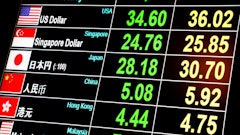Process improvements directly improving price/earnings ratio, market capitalization and cash flow, Aberdeen finds
Boston — October 19, 2005 — Two-thirds of companies in a recent survey said that improving global trade management is among their three most important initiatives, and 35 percent of companies report that chief financial officers (CFOs) are increasingly taking a leadership role in these initiatives, according to a recent report from AberdeenGroup.
According to "The CFO's Agenda for Global Trade," a new Aberdeen benchmark report, the ability to improve global sourcing is now determining a company's revenue growth, profitability and market success. A $1 billion company can free up $10 million to $40 million in cash by better controlling global trade processes, directly impacting price/earnings ratio and market capitalization.
As more of the business is tied up in global trade, working capital cycles become longer and harder to manage. More working capital is tied up in inventory to combat longer and more uncertain international lead times, proactive use of accounts payables balances degrade, accounts receivables become slower and cash movement becomes more complex.
"CFOs are in a unique position to lead the drive toward less risky and more effective trade processes," said Beth Enslow, vice president of enterprise research and report author. "They see the impact of business tradeoffs on strategic corporate objectives and financial performance. They also have corporate governance responsibilities to ensure fiscally responsible operations."
Other key findings in the report include:
Additional Articles of Interest
— Is your company looking closely at procurement outsourcing, but doesn't quite know where to begin? These 10 steps are a good place to start for any finance professional who is studying this growing market. Read the article "Procurement Outsourcing: The 10 Things Finance Professionals Want to Know," an SDCExec.com exclusive.
— Tax and supply chain management are often considered to be two distinct disciplines, but this view misses an opportunity to leverage the business benefits achieved by an automated and integrated tax department. For more insights, read "Transaction Tax Management: A Seat at the Supply Chain Table," an SDCExec.com exclusive.
— For examples of companies implementing warranty management solutions to reduce costs and improve product quality see the SDCExec.com daily news items on Carrier, auto supplier ArvinMeritor, retailer Sears and appliance manufacturers Whirlpool and Sub-Zero deploying these types of solutions.
Boston — October 19, 2005 — Two-thirds of companies in a recent survey said that improving global trade management is among their three most important initiatives, and 35 percent of companies report that chief financial officers (CFOs) are increasingly taking a leadership role in these initiatives, according to a recent report from AberdeenGroup.
According to "The CFO's Agenda for Global Trade," a new Aberdeen benchmark report, the ability to improve global sourcing is now determining a company's revenue growth, profitability and market success. A $1 billion company can free up $10 million to $40 million in cash by better controlling global trade processes, directly impacting price/earnings ratio and market capitalization.
As more of the business is tied up in global trade, working capital cycles become longer and harder to manage. More working capital is tied up in inventory to combat longer and more uncertain international lead times, proactive use of accounts payables balances degrade, accounts receivables become slower and cash movement becomes more complex.
"CFOs are in a unique position to lead the drive toward less risky and more effective trade processes," said Beth Enslow, vice president of enterprise research and report author. "They see the impact of business tradeoffs on strategic corporate objectives and financial performance. They also have corporate governance responsibilities to ensure fiscally responsible operations."
Other key findings in the report include:
- More than two-thirds of companies have current projects or future plans to enhance financial management systems and trade compliance technology.
- Innovators are taking advantage of physical supply chain triggers to apply pre-, in-transit, or post-shipment inventory financing, discounting or payables extensions.
- Nearly three-quarters of companies plan to increase their use of trade services from financial institutions to lower transaction costs, smooth cash flow and make it easier for international customers and suppliers to do business with them.
Additional Articles of Interest
— Is your company looking closely at procurement outsourcing, but doesn't quite know where to begin? These 10 steps are a good place to start for any finance professional who is studying this growing market. Read the article "Procurement Outsourcing: The 10 Things Finance Professionals Want to Know," an SDCExec.com exclusive.
— Tax and supply chain management are often considered to be two distinct disciplines, but this view misses an opportunity to leverage the business benefits achieved by an automated and integrated tax department. For more insights, read "Transaction Tax Management: A Seat at the Supply Chain Table," an SDCExec.com exclusive.
— For examples of companies implementing warranty management solutions to reduce costs and improve product quality see the SDCExec.com daily news items on Carrier, auto supplier ArvinMeritor, retailer Sears and appliance manufacturers Whirlpool and Sub-Zero deploying these types of solutions.
- More research from AberdeenGroup.
![Pros To Know 2026 [color]](https://img.sdcexec.com/mindful/acbm/workspaces/default/uploads/2025/08/prostoknow-2026-color.mduFvhpgMk.png?auto=format%2Ccompress&bg=fff&fill-color=fff&fit=fill&h=100&q=70&w=100)




![Pros To Know 2026 [color]](https://img.sdcexec.com/mindful/acbm/workspaces/default/uploads/2025/08/prostoknow-2026-color.mduFvhpgMk.png?ar=16%3A9&auto=format%2Ccompress&bg=fff&fill-color=fff&fit=fill&h=135&q=70&w=240)



